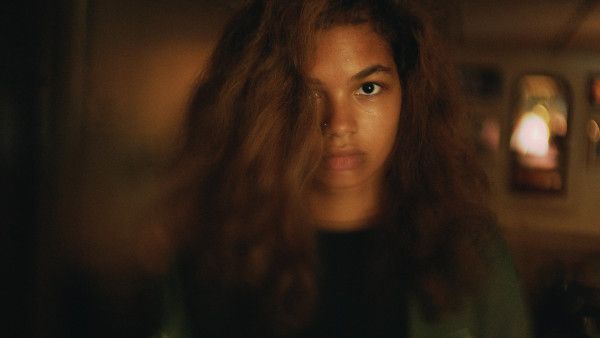Eye For Film >> Movies >> Madeline's Madeline (2018) Film Review
Madeline's Madeline
Reviewed by: Amber Wilkinson

At the very start of Josephine Decker's latest film, the lead character is told: "What you're experiencing is just a metaphor." If that's the sort of phrase that already has your pomposity alarm jangling then the rest of Madeline's Madeline is probably not for you. But at least you can't say the writer/director didn't warn you.
Madeline (Helena Howard, making a wallop of a debut) is not in a good place mentally. Although her problems are never specifically outlined, there's a constant anxiety about her, amped up by disorienting visuals and sound that put the viewer on edge. Her mum (Miranda July) isn't much better, although her anxiety is much more obviously centred on her daughter - as Madeline pretends to be a cat, she plays along, as Decker explores the tension between whether she is supporting her daughter or merely facilitating additional problems. The cat exercise is one of a number of intense role plays given to her at her acting class by Evangeline (Molly Parker).

We swoop into Madeline's mind as she imagines herself as a turtle on a beach but we're also privy to the way that Evangeline seems happy to manipulate the youngster, encouraging her to explore potentially dangerous emotions, if it means she can get the performance and the production she wants.
Like her previous two features, Butter On The Latch and Thou Wast Mild And Lovely, this is a woozily shot, dislocating experience that in its best moments generates the sort of tense mental anxiety that Lynne Ramsay has made her calling card. Cinematographer Ashley Connor - who also recently shot the Sundance US Dramatic Competition winner The Miseducation Of Cameron Post - is definitely one to watch. But though this succeeds as an emotionally charged mood piece, the structure doesn't withstand much scrutiny.
This is probably because the storyline was devised over a period of eight months with a group of New York actors, meaning that while it captures a real sense of the performance art bubble, it also feels confined by that introspection. If the performance element all gets rather overblown, the central core concerning power dynamics and the games people wittingly and unwittingly play remains compelling. Howard's performance vacillates wonderfully between a sense of tight control and utter skittishness, while Parker manages to blend a sinister controlling edge with disarmingly maternal tendencies. July, although in the smallest of the three roles, also brings an emotional ambiguity to Madeline's mum that means we can never settle to judgement.
Interestingly, one of the film's best scenes comes when where the camera and sound fun and games stop for a moment, during a conversation between Madeline and Evangeline's husband George (Curtiss Cook). We see Madeline trying a power game of her own that doesn't require loopy visuals to be disturbing. Decker continues to push the boundaries when it comes to psychological cinema and I'm looking forward to the day when she decides that less might be more.
Reviewed on: 25 Feb 2018
















